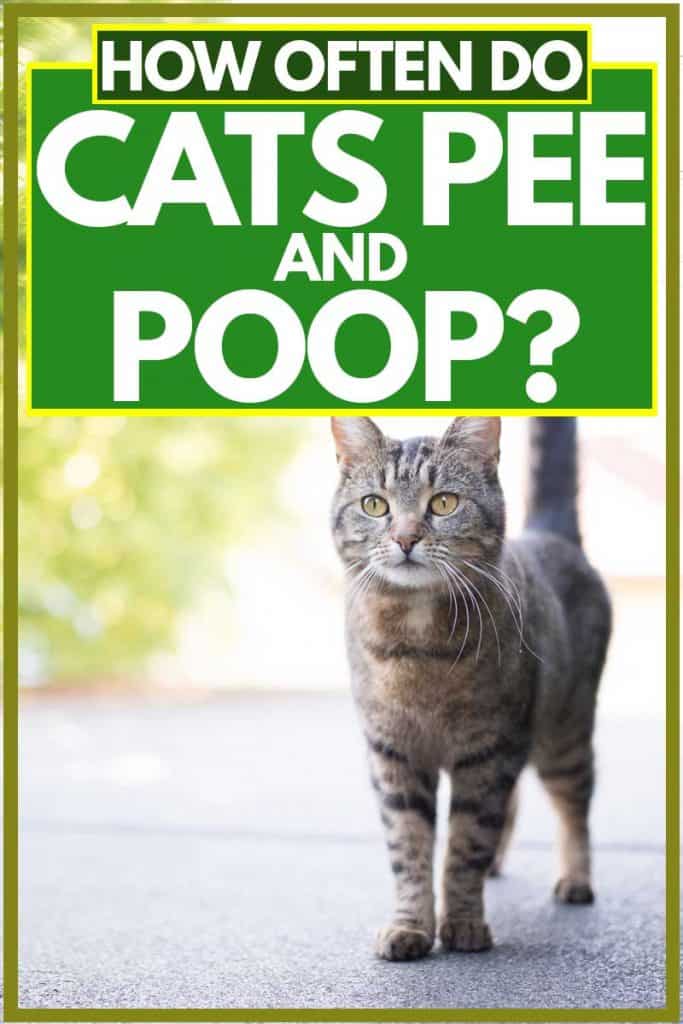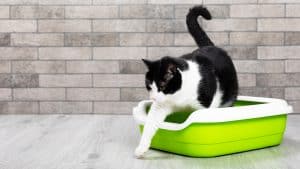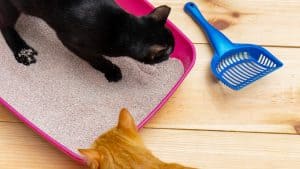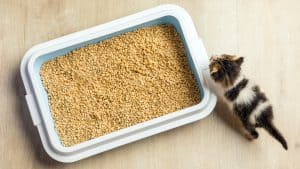Ever wondered how often your cats pee and poop? This article is your go-to guide.
We'll talk about when and why cats go to the loo, how often kittens do it, and what to look out for to keep your cat healthy.
Let's explore the ins and outs of your cat's potty habits. It's simpler than you think and might even save you some cleanup time!
What Does The Research Say About How Often Cats Pee And Poop?
As you scoop clumps of urine and lumps of poop from the litter box, you’ll be happy to know that healthy cats and kittens are regular eliminators.
Healthy, adult cats normally pee two to three times per day and poop at least once per day. Your adult cat’s elimination routine might vary slightly from the average cat, depending on:
- Age
- Hydration
- Food Consumption
- Medical Condition(s)
- Intake of Medications and Supplements
- Exercise
Scooping the litter box clean, at least once a day is a good way to monitor your cat’s elimination of urine and excrement.
Keep reading to learn about healthy elimination routines for cats and kittens. We’ll also discuss warning signs that you might find in the litter box to alert you to consult a veterinarian to address potential health issues for your cat.
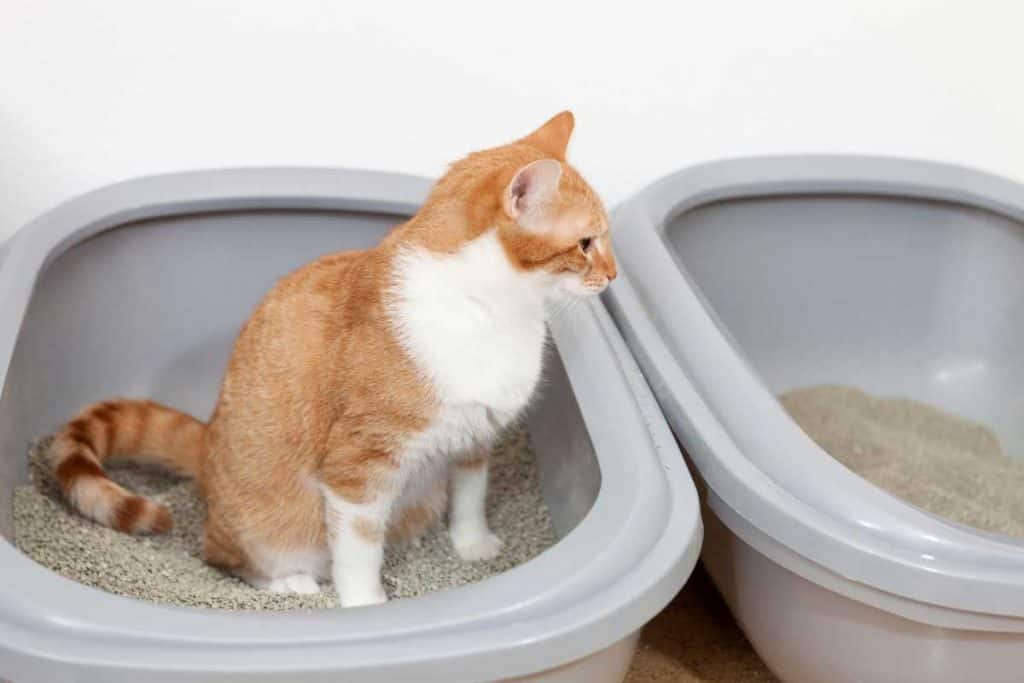
How Often Do Kittens Pee and Poop?
Healthy kittens typically urinate after each feeding.
- Newborn to 2.5-week-old kittens eat every two to three hours and urinate approximately twelve (12) times per day.
- Kittens aged 2.5 to 3 weeks old eat every four hours and urinate approximately six (6) times per day.
- Older kittens, aged three weeks and older who are weaning and learning to eat solid foods, urinate approximately four (4) times per day.
Kittens have more frequent bowel movements than adult cats, between one (1) to four (4) times per day. Healthy kitten feces should have a soft, yet firm paste-like consistency and dark brown color.
How To Help A Kitten Eliminate?
Mother cats help young kittens to eliminate by stimulating the kittens’ bowels. Once they reach the age of four weeks old, kittens are capable of independent bowel movements.
At this age, you can begin to litter train kittens.
Elimination Stimulation
If you’ve rescued an orphaned kitten, or the mother cat is not actively caring for the kitten, you can help a kitten to eliminate after each feeding. Gently rub the kitten’s belly, genitals, and anal areas with a warm, soft cloth.
It should take approximately one minute for the kitten to urinate or move its bowels. Wash the kitten afterward and thoroughly wash your hands after handling kitten excrement.
Litter Box Training
You can begin to litter train kittens when they curiously stray away from the mother cat, between the ages of three to five weeks old.
First, prepare a small box with just enough litter to cover the bottom. Do not use clumping litter for kittens. Choose an organic material, non-clumping litter instead.
Introduce the kitten to the litter box by gently placing the kitten inside. Allow the kitten some time to explore the litter box.
Curious kittens might scratch at the litter, taste the litter, and pounce in the litter as they explore by playing in the box.
Eventually, instinct will kick in, and the kitten will do his business in the litter box. If he needs further encouragement, you can add the used cloth to the box that had been used previously during elimination stimulation.
For more great tips and tricks on how to litter train kittens, check out our blog, “When to Start Litter Box Training Kittens.”
Do Cats Pee When They Poop?
Typically, cats pee and poop at separate times throughout the day. Adult cats will do their business in the litter box and then cover urine and feces with litter afterward.
Is It Normal For A Cat To Not Poop Every Day?
Adult cats typically have one to two bowel movements daily. It is not normal for a young adult cat to either not poop at all or to poop several times daily.
If you observe changes in the frequency of your cat’s bowel movements, feces color, or feces consistency, you should consult your veterinarian for medical advice.
Healthy feces should be solidly formed, although not rock hard, and dark brown. Always seek immediate veterinary care if you observe:
- Blood in your cat’s stool.
- Diarrhea lasting longer than 48 hours (liquid or paste-like stool).
- Constipation that lasts longer than 72 hours (physical difficulty to poop resulting in dry, hard, or ribbonlike stool)
Several factors can influence your cat’s bowel movements. By paying attention to the excrement in the litter box and your cat’s diet, grooming routine, play routine, and health issues, you can help to keep your cat regular.
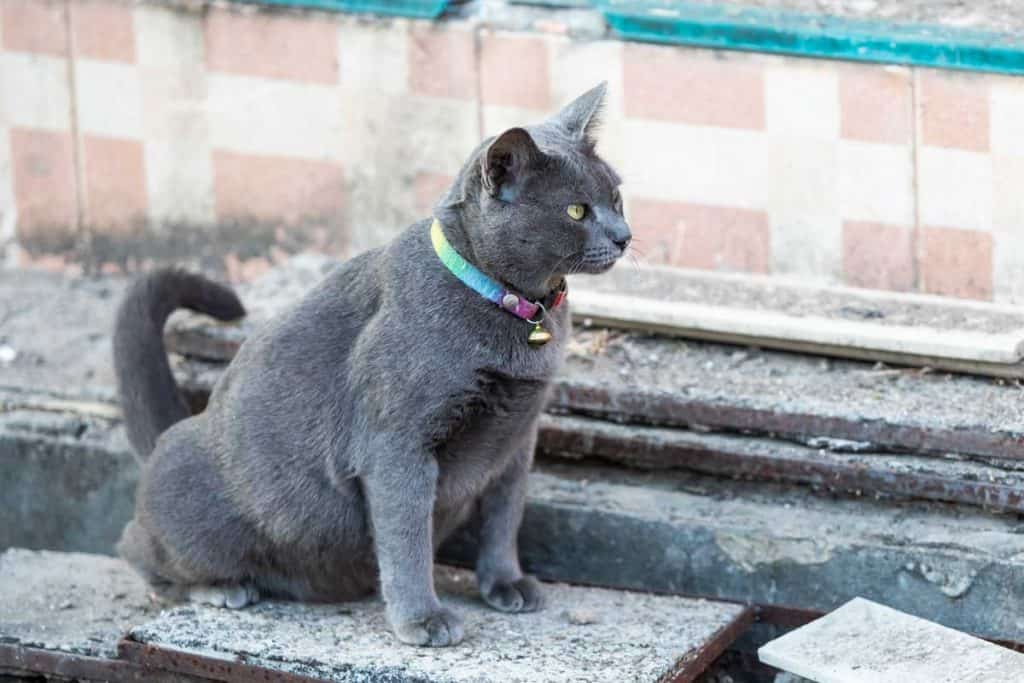
What Can An Increase In Urination Frequency Mean For A Cat?
Increased frequency of urination means your cat is likely experiencing an underlying, significant health issue.
It can be referred to as oliguria, a condition in which the body cannot sufficiently eliminate urine or reduces the amount of urine produced by the kidneys due to bodily fluid loss elsewhere.
If you observe your cat peeing more frequently, at normal or lesser volume, he might have a urinary tract blockage or inflammation, or bladder infection or inflammation. Oliguria should be treated by a veterinarian as soon as possible.
How To Deal With Constipation In A Cat?
Constipation can happen to any adult cat but, if it does not resolve on its own within a few days, you should seek a medical consult from your vet.
Signs your cat is constipated include:
- Observing your cat demonstrating physical strain while pooping.
- Meowing while using the litter box.
- Feces that appears dry, hardened, or tan colored.
Over-Grooming
Cats do like to keep themselves clean but, too much self-grooming can cause your cat to become constipated. It’s entirely normal for cats to ingest a little bit of their hair during self-grooming.
Typically, the hair passes through their digestive systems without an issue. Over-grooming can cause excess hair build-up in your cat’s digestive system, making it difficult for him to have a bowel movement or leading to the potential development of obstructive hairballs.
If your cat is over-grooming, you might notice excessive amounts of hair in his poop. Consult your vet to provide either a home remedy or medication to ease digestion and break apart hairballs.
You and your vet can also explore potential reasons why your cat might be over-grooming to resolve a medical condition such as:
- Anxiety
- Irritated Skin
- Disease-Related Excess Shedding
Dehydration
Your cat might become constipated if she is not drinking enough water. Dehydration is more common among elderly cats than younger, adult cats.
Elderly cats often skip daily bowel movements because they are slightly dehydrated. Providing your cat with multiple, freshwater sources is an excellent way to avoid constipation from dehydration.
But, several chronic diseases can also cause dehydration, such as:
- Kidney Disease
- Diabetes
- Hyperthyroidism
- Megacolon
Contact your veterinarian for a consultation if your cat is constipated due to dehydration. In the meantime, the best way to deal with constipation is to increase your cat’s water consumption.
You might try encouraging your cat to drink by giving ice cubes as treats or serving your cat tuna water for a bit of added flavor.
Litter Box Habits
As we conclude our feline bathroom exploration, here's a valuable tip that you can consider a secret weapon: watch the litter box.
Understanding the frequency of your cat's bathroom visits, as well as the look and texture of their urine and feces, is a key step in ensuring their well-being.
Regular monitoring might seem unimportant, but it's crucial to keeping your pet cat in tip-top health. Why is that? Simply put, your cat's "output" is a direct reflection of their overall health.
It's like a window into their body's workings. A healthy cat will have consistent routines, with regular urination and defecation, and their waste should maintain a predictable color and texture.
Now, what if you notice a change? Perhaps you see a shift in frequency, or their urine or feces looks different? Don't panic, but don't ignore it either. These can be telltale signs that your cat's health might be shifting.
Changes in elimination habits could be linked to a variety of factors. It might be due to a new diet, a response to a stressful event, or it could signal a developing health condition.
That's why it's important to reach out to your vet. They can help figure out what's going on and ensure your feline friend gets the care they need.
Remember, you're the first line of defense when it comes to your cat's health.
Regular monitoring, coupled with your natural intuition, can be instrumental in catching health issues early on. After all, nobody knows your pet better than you do.
